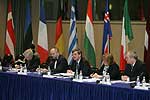High-level talks focus on enhancing NATO-Russia defence cooperation
Defence and military experts from NATO member countries and Russia met in Vilnius on 28 February to share views on opportunities and challenges in deepening NATO-Russia defence cooperation, in particular in enhancing the ability of Russian and NATO forces to work together in military operations.
Meeting under the auspices of the NATO-Russia Council (NRC) Working Group on Defence Reform and Cooperation, high-level representatives engaged in wide-ranging discussion on NATO transformation and Russian military reform, on steps to ensure transparency and enhanced cooperation as the two processes unfold, and ways to develop longer-term perspectives on NRC defence and military cooperation.
The theme of the seminar and high-level meeting was “Enhancing the Partnership: NATO’s Transformation, Russian Military Reform, and the Future of NATO-Russia Defence Cooperation.” This agenda reflected the importance NRC Defence and Foreign Ministers place on practical aspects of the partnership including developing interoperability – the ability of the military forces of NATO nations and Russia to work together in military operations – and on turning the theory of defence cooperation into practice.
The meeting was organised in recognition of the critical importance of cooperation between NRC nations today as they face common security challenges – and common priorities and opportunities as well – and in recognition of the need to work closely together to build understanding and address misunderstanding. To that end, the discussion touched on topics including developing defence cooperation, transparent approaches to future planning and defence budgets, and developing standards to enable militaries to operate together.
Issues highlighted in the meeting for further development by the Working Group on Defence Reform and Cooperation include strategic objectives, political-military support and resource commitments for military interoperability efforts, enhanced defence planning transparency, and development of joint capabilities.
The discussion was intended to complement an increasingly substantial programme of practical military cooperation, involving training, exercises, and operations. Most recently, operational cooperation included the contribution last year of a Russian Navy ship to Operation Active Endeavour – NATO’s maritime surveillance operation in the Mediterranean – the first such contribution from a non-NATO nation, and one expected to be repeated later this year.
The meeting in Vilnius was particularly timely as NRC nations prepare to mark the ten-year anniversary of the NATO-Russia Founding Act and the five-year anniversary of the establishment of the NATO-Russia Council later this year. The anniversaries will provide a useful opportunity to reflect on progress to date in terms of both political engagement and practical military cooperation, and to consider the way ahead in this important partnership.
Defence cooperation has been a productive and constructive part of joint activity in the last five years with NRC nations sharing experiences on the modernisation and management of their armed forces, supporting programmes to assist in the resettlement of military personnel, developing education programmes for military officers in Moscow and at the NATO Defense College in Rome, and developing political guidance for the interoperability of the forces of NRC nations.
